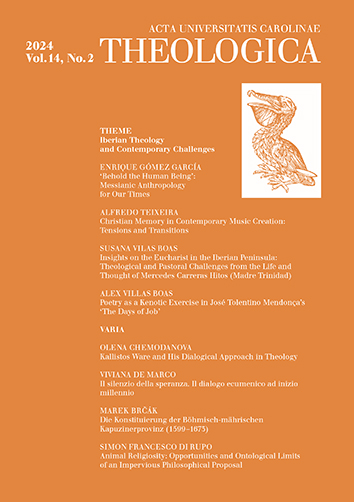AUC Theologica is a peer-reviewed journal for theology published twice a year. As we publish original papers in English, German, French, and Italian, our mission is to serve as a platform both for Czech researchers, who can present their research results in these languages, and for international contributors, who are invited to enter the academic theological discussion in the heart of Europe.
The journal focuses on a wide range of theological disciplines, such as systematic theology, biblical studies, patristic studies, pastoral and spiritual theology, religious education, church history, etc. Within these fields, the journal seeks to reflect the current theological questions and problems, which often requires interdisciplinary approaches. Supporting the intersection of various theological disciplines, we thus also welcome theological papers touching other academic fields including philosophy, sociology, literary studies, and science.
Each issue consists of two sections. The thematic section presents papers of the same focus. The section called ‘Varia’ invites papers dealing with various theological themes from the perspective of all Christian traditions. Our current and past issues are approachable for free on this website in the form of Open Access.
AUC THEOLOGICA, Vol 9 No 2 (2019), 81–93
Reception of Isa 7:17 in Qumran: The Use of Ambiguity of the Biblical Text
Libor Marek
DOI: https://doi.org/10.14712/23363398.2020.7
published online: 18. 06. 2020
abstract
Verse 7:17 from Isaiah presents its interpreters, both ancient and modern, with difficulties and ambiguities regarding the text that must be accounted for on the level of formulation (problematic grammar), content (uncertain meaning) and incorporation into the larger context of Isa 7:1–17. The Damascus Document from Qumran uses this verse twice (in CD VII & XIII) in texts of different types (Admonitions and Laws). The author of the Damascus Document resolves the ambiguities of the biblical verse and incorporates it into his two compositions for the benefit of his argumentation. This type of redactional work is possible due to a recognition by the author of a continuity between the biblical Israel and the current (Qumran) community. While resolving the problems inherent to the biblical verse, the author of the Damascus Document also creates a new tension between the ways in which this verse is incorporated into the two documents.
keywords: Syro-Ephraimite War; Damascus Document; Ambiguity; Reception

Reception of Isa 7:17 in Qumran: The Use of Ambiguity of the Biblical Text is licensed under a Creative Commons Attribution 4.0 International License.
148 x 210 mm
periodicity: 2 x per year
print price: 100 czk
ISSN: 1804-5588
E-ISSN: 2336-3398
